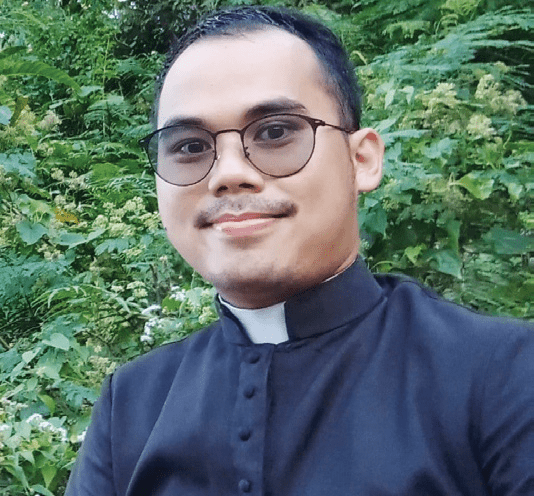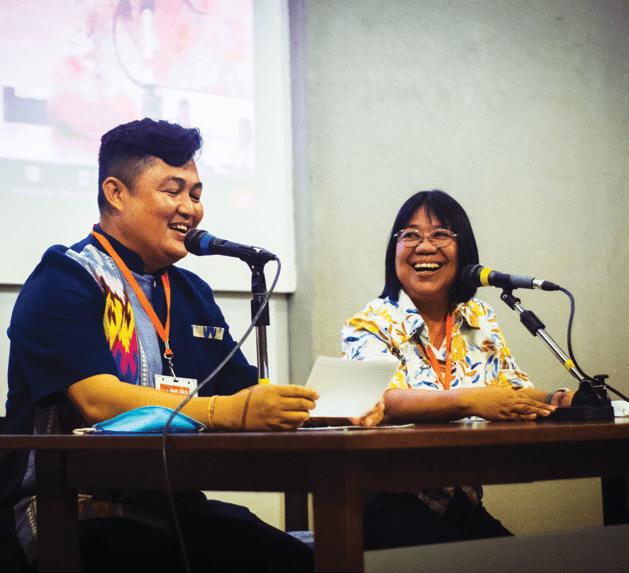New City: John Paul, can you tell us briefly what characterized SOR’s special course of formation this year?

John Paul: On the occasion of its 40th anniversary, the School of Dialogue with Oriental Religions organized a three-day course of formation from May 20-22, 2022, at the auditorium of the Mariapolis Center here in Tagaytay. Its theme for this year is “Dynamics between Faith, Culture and Interreligious Dialogue in Asia.”
It was the first time the SOR has done a course in a hybrid format. Most of the participants (79%) joined via Zoom, and 21% participated face-to-face. There was a total of 334 participants from the Philippines, Thailand (Bangkok & Chang Mai), Indonesia, Singapore, Malaysia, Myanmar, Vietnam, Pakistan, India, Taiwan, Hong Kong-China, Korea, Australia-Oceania, and the Focolare’s center of interreligious dialogue in Rome (Italy).
New City: How was the SOR’s theme, “Dynamics between Faith, Culture and Interreligious Dialogue in Asia,” developed during the three-day school?
John Paul: Although each day of the school was distinct from the others, I could say that it was also seamless because all the sessions were very integrated. The introductory session, for example, by Dr. Lolita Castillo, Co-Director of SOR, laid the foundation of the school by providing an insightful presentation of the history of the School of Dialogue with Oriental Religions. This was followed by an extensive presentation on the teachings of the Church on interreligious dialogue by Fr. Matteo Rebecchi, SX, an Italian Xaverian priest. The opening remarks by Fr. Piero Coda, via a video message, brought to light three fundamental tasks of a school of dialogue: first, it is necessary to know Jesus, because Jesus is the way of dialogue, the way of unity; second is to help one in knowing the other, the other religions; and the third, learning how to dialogue.
New City: Academic experts specialized in the field of interreligious dialogue, as well as the presence and guidance of Church authority have contributed to the success of this year’s course of formation. What are the insights you got from what they have presented?
John Paul: Indeed, experts in interreligious dialogue were present, each contributing to providing the participants with substantial knowledge in the endeavor of engaging in dialogue. Moreover, this year’s special course of formation was graced by the presence of one of the leaders of the local Church in the Philippines, Most Rev. Roberto Mallari, the Bishop of San Jose, Nueva Ecija and the present dean of SOR. In his opening remarks, he shared the great challenge of living out the unity among other religions and cultures due to the growing influence of individualism and materialism. And the key to facing this challenge can be addressed through synodality, by journeying together, which is now becoming the path or process of the Church because of Pope Francis. SOR Co-Director Dr. Eddie Hsueh, with his expertise in the field of dialogue, presented the dynamics between faith and culture. He explained the importance of being aware that dialogue is part of our human nature and a calling from God. Dr. Hsueh emphasized one important point: “We are called to dialogue.” Dialogue is part of connecting or relating to others. However, due to the challenge of advanced technologies, people have become poor in their interpersonal communication. In the light of faith, he discussed the importance of going back to the communion of the Trinity as the model of dialogue.
New City: Interreligious Dialogue is an integral component in the continuing work of the Church’s evangelization. How was this tackled by the speakers?

John Paul: The Church exists to give witness to the Gospel. This was emphasized during the session with Prof. Roberto Catalano from the Sophia University Institute in Loppiano, near Florence (Italy). Prof. Catalano underlined the importance of being open to others and being a witness to the Gospel of Christ. A form of evangelization that was highlighted was inculturation. Fr. Jose Vidamor Yu, a professor of the Divine Word Institute of Mission Studies, dealt lengthily with the inculturation of faith in Asia. He affirmed that the effort of making the Gospel relevant is not mainly directed towards renewing local liturgical rites. In fact, he clearly stated that “inculturation is not just about liturgy… it speaks about the local Church.” He also said that “inculturation is a dynamic process or movement as an approach or as a result of an encounter between the Gospel and culture… It is not an end in itself. It is a process that has to be done in a particular context or time.” A very prominent Church personality also joined the plenary, linked via Zoom, Msgr. Indunil J. Kodithuwakku K., Secretary of the Pontifical Council for Interreligious Dialogue in the Vatican, spoke about the untiring endeavor of the Church to foster universal fraternity on all fronts. He presented the “Recent Developments in the Teachings of the Church on Interreligious Dialogue” and gave particular emphasis on the papacy of Pope Francis which focuses on dialogue, fraternity, care for creation, and reconciliation.
New City: Dialogue and communication are inseparable. What was offered to the participants to be successful in dialogue?
John Paul: On the last day, Ms. Tita Puangco, former CEO of Ancilla Enterprise Development Consulting, gave a talk on the “Usage of Language in Communication and Dialogue.” The session was filled not only with concepts but with the concrete experiences of the speaker. She stressed the importance of being aware of and open to the culture of people of other religions, especially the way they think and communicate.
New City: How does the spirituality of unity of the Focolare Movement enliven the very mission of SOR?
John Paul: This was very much clear in the presentation by Dr. Lolita Castillo, Co-Director of SOR. She presented how much the mission of SOR in bringing ahead the work of interreligious dialogue is a concrete expression of the Focolare’s spirituality of unity. In her talk, she mentioned five principles emanating from the charism of unity of Chiara Lubich that have found a shared and enlightened understanding in the dialogue with different religions in Asia. They are: God is Love, the Word of God, Jesus in the Midst, Jesus Forsaken, and Mary.
New City: As a seminarian, how do you see interreligious dialogue now? What are the significant learnings you bring with you after SOR’s special course this year?
John Paul: I learned that this school is not all about studying books; it is a school of life. Life is all about building a relationship with God and neighbor. The SOR’s mission helps me to form myself to be an agent of dialogue with people of different cultures, traditions and religions, and to accept them with openness, sincerity, and fraternal charity.
Challenges are always part of our journey. These challenges stimulate everyone to really live out the faith in the context of our culture and our relationship with other religions. This means that Christian faith is always active. Yes, dialogue with other religions is a long process, but we all must commit ourselves, being agents of dialogue to contribute to the realization of Jesus’ prayer “that all may be one” (John 17:12).
Interview by Romeo Pelayo Vital




